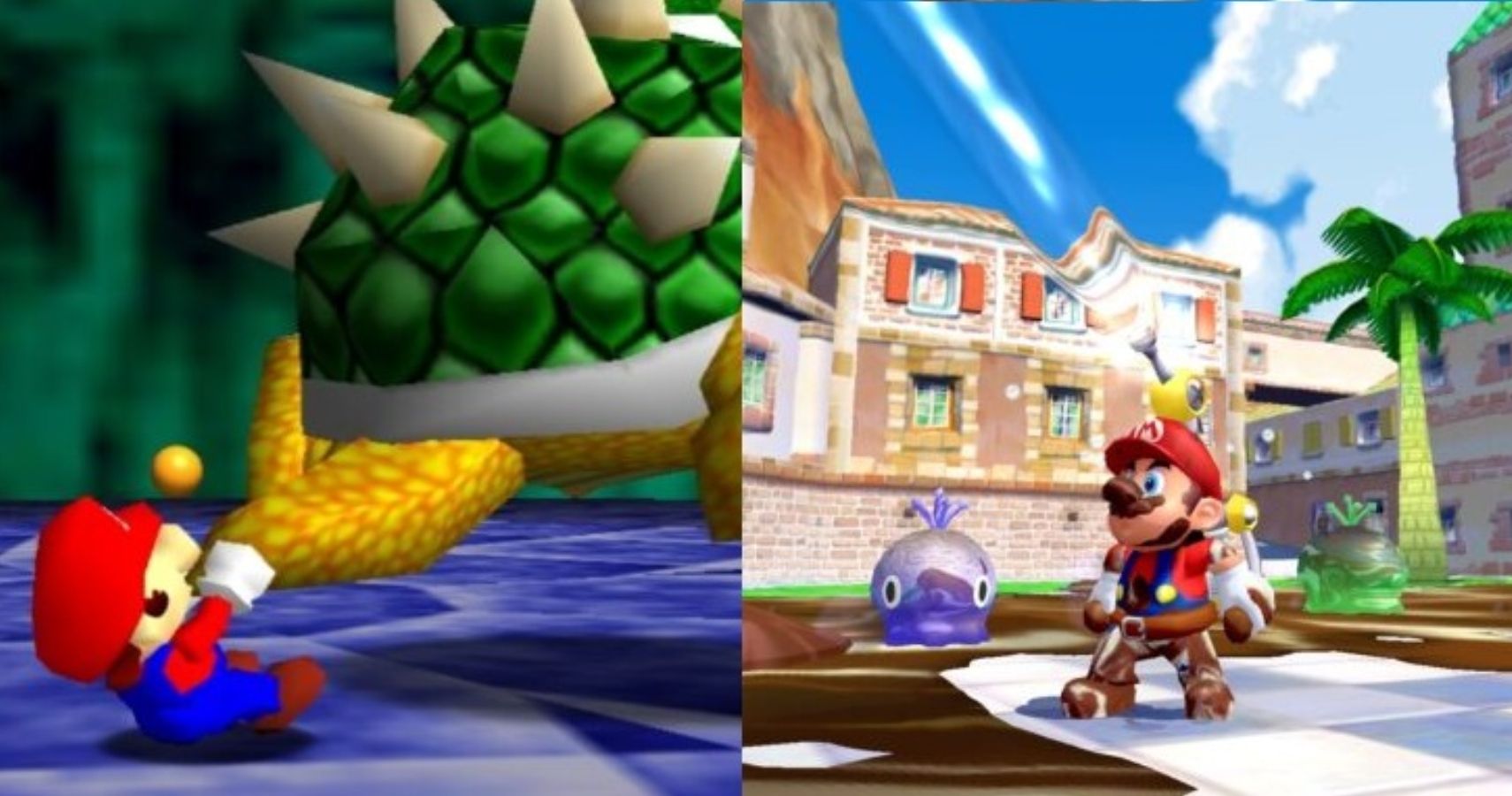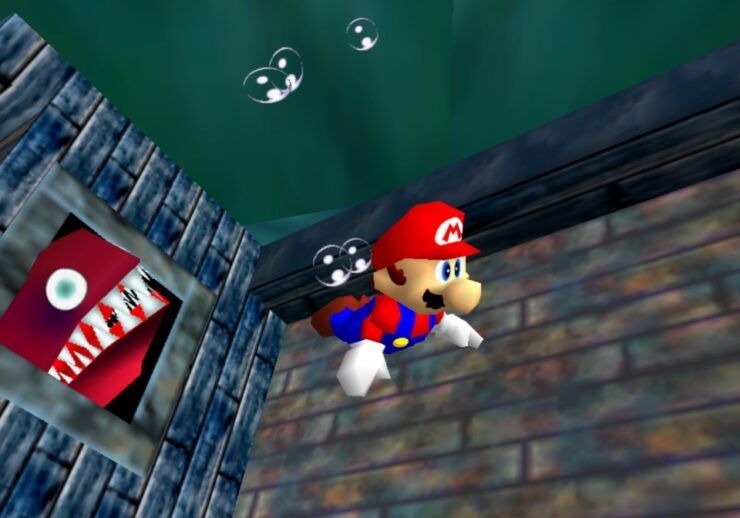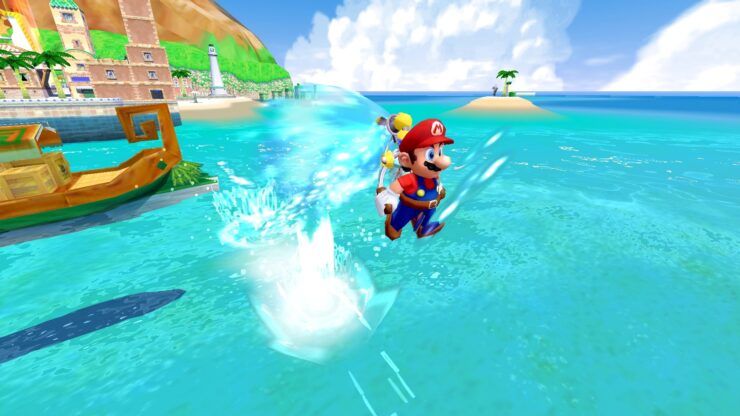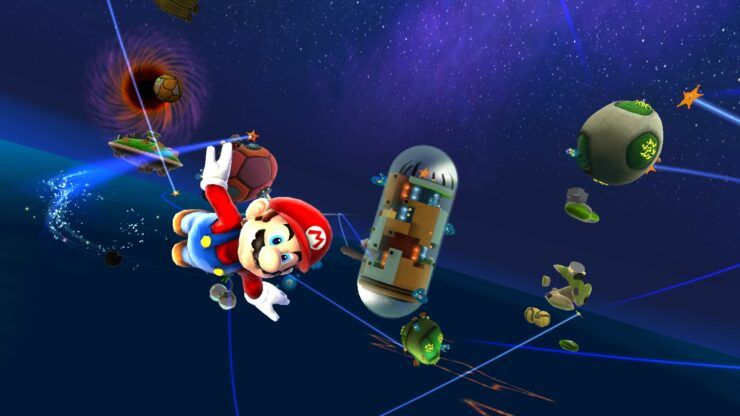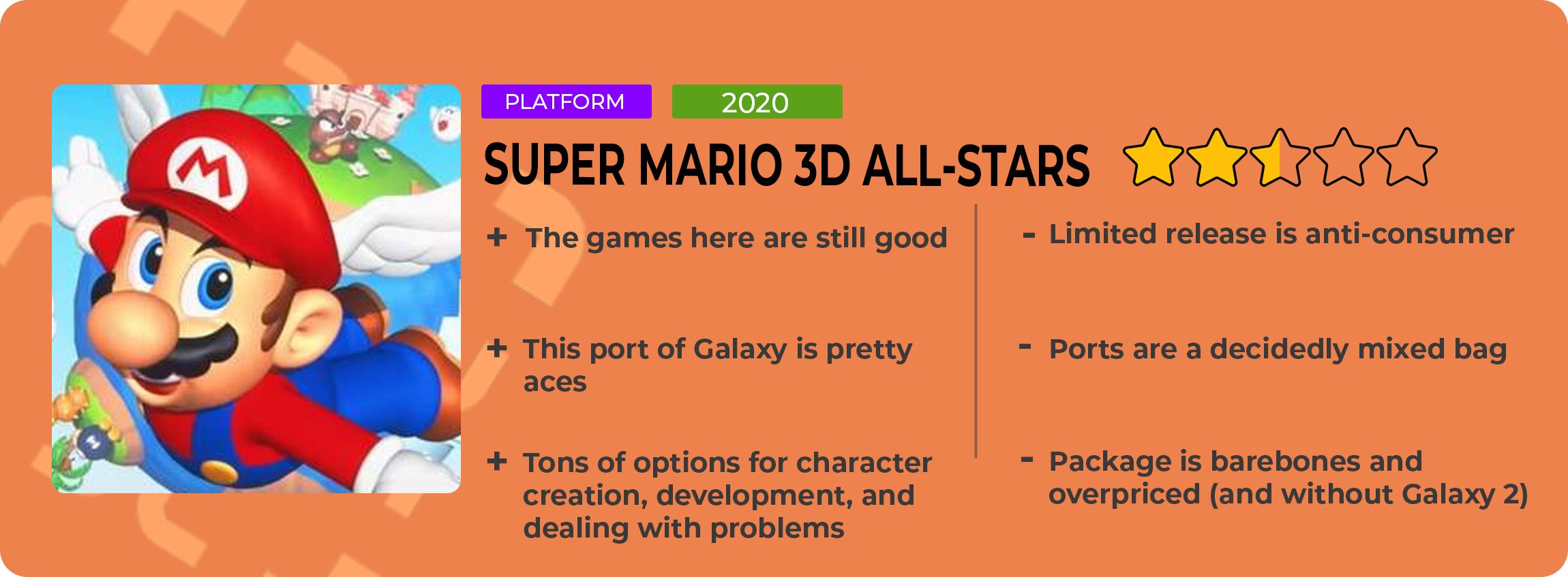I'd recommend two of the games in Super Mario 3D All-Stars to just about anyone. It's hard not to - Super Mario 64 defined the 3D platformer in its time, and Super Mario Galaxy proved the Wii's AAA viability against the powerhouse 360 and PS3. They're important games, and for good reason - they mostly hold up as whimsical, enthralling adventures for kids of any age.
Oh, Super Mario Sunshine's also here. If you want that.
Point being, this new collection on the Switch should be a home run. You have a handful of some of the greatest platformers of all time, on what I consider to be my favorite console of all time. What could go wrong? Well, as it turns out, more than a few things.
A ROM Of Mario 64? That'll Be $20
What Nintendo's offering up here, essentially, are three games for sixty bucks. Now, for twenty bucks a pop, you'd expect these ports to be the very best versions of their respective titles. Unfortunately, that's just not the case, as Super Mario 64 feels clunky and unwieldy on a Switch.
In the case of Mario 64, platforming doesn't feel great on the Joy-Cons. A certain degree of that can be chalked up to the game's age, but I do think divorcing the game from its original platform hurts the deliberate nature of its platforming. Navigating narrow ledges or landing precise jumps feels too loose and imprecise for my liking. Despite the notoriously fragile N64 controllers, this game just feels better on that platform.
On top of that, the visuals have just been uprezzed and smoothed out, without much in the way of restorative work done - outside of crisp new menu lettering and art. That makes the whole thing look blockier, more angular, and less charming than it does running natively on an N64. Plus, in keeping the game's native resolution, Nintendo has seen fit to leave two ugly pillar boxes on the side without any sort of new art - or any art, for that matter.
This version of the game feels like playing a bare-bones emulation on the PC with a gamepad clumsily grafted onto the experience. It's certainly not worth twenty bucks, and it's a pretty bad way to commemorate one of the greatest games of all time.
Walkin' On Sunshine
Sunshine and Galaxy fair a good bit better, but the latter is the only game in this package that I'd call a "good" port.
Now, Sunshine is pretty - there's no denying that. No longer tied to composite or component cable outputs, the vibrant visuals of the 2002 GameCube smash really pop at 1080p. But despite less smudge and less aliasing on the package, a frustrating control choice and some confusing audio issues got in the way of my enjoyment.
First of all, without pressure-sensitive triggers, Sunshine is lacking one of the coolest parts of its original control scheme. You can't selectively control Mario's FLUDD stream anymore, and instead, you're tied to uniform running and standing blasts. Sure, this doesn't affect a lot of the required platforming upfront, but it is a truncated version of the original experience. Plus, the audio track is handled poorly, with button tutorials being cut out of the audio track entirely and not replaced. This leads to strange prompts like "press the button" instead of "press the A button," which is fairly jarring.
Plus, there's the elephant in the room - Sunshine can look and run better. While I'd never explicitly tell you to go out and steal this game, the fact of the matter is that the emulation scene has spent years improving Sunshine. This game can look better, run at 60 FPS, and retain the original control scheme. For Nintendo to effectively say a lesser version is worth paying $20 in 2020 for is, frankly, baffling.
A Galaxy Of Fun
At the very least, though, 3D All-Stars has an ace in the hole, and it's almost worth recommending this collection for it alone: Super Mario Galaxy. Galaxy's an indisputable classic, not to mention my third-favorite Mario title, and this is the definitive version of it in my mind.
From top to bottom, this is a great port - and remarkably similar to the one released for the Nvidia Shield in China, to the point where I wonder if this isn't just that version of the game. Regardless, it's the best Mario Galaxy has looked... kind of. You see, despite the beautiful resolution, and despite the consistent 60 FPS frame rate, the colors on this version look a bit washed out and blend together. When played side-by-side with the original, this port has the clear edge on the detail department, but the Wii (and Shield) ports have distinctly better colorwork.
Regardless, this is still the best legal way to play Galaxy. It feels great, looks good, and makes expert use of the JoyCons as analogs for the Wii remote and Nunchuck. Sure, it's definitely lacking in some details, but in terms of legal ways to play Super Mario Galaxy in 2020, you could do a hell of a lot worse.
Why Is This $60, Again?
3D All-Stars is Nintendo's latest attempt at bundling together Mario titles under one unified banner. The last time they did this, it was 2011, and they thought selling a ROM of Super Mario All-Stars for the SNES ripped to a Wii disc for $30 was a great deal. The time before that? Well, uh... it was that SNES game. Eighteen years prior.
Fast-forward to 2020, and it seems like Nintendo hasn't budged much on that front. 3D All-Stars does come with three games and three soundtracks, which is an undeniably good value on the surface. But let's scratch below that a little bit - is it actually a good value, or have we been collectively Stockholm'd into being okay with Nintendo's strange treatment of legacy titles?
Personally, I think it's the latter. First of all, who's going to sit and listen to Mario music on their Switch? There are way better ways Nintendo could make that music available to the public, from ensuring the CDs stay in print to streaming it like most major publishers. Locking a wealth of classic bops behind a $60 collection of emulated ports is not only confusing, it's restrictive and byzantine.
But mostly, my issues lie with the ports. 64 feels bad and is locked to its original framerate. Sunshine is a bit better, but missing a vital part of its control scheme and a far cry from better-emulated versions. Galaxy's the best of the bunch, and would maybe be worth $20 on its own, but still lacks some of the color depth found in the original. So, are any of these really worth sticker price?
I'd argue not. Sixty bucks can get you a lot of things, and in a time where money's tight the world over, I don't think Nintendo can justify the value of this package. When franchises like Crash Bandicoot and Spyro have come back with better-looking remakes with more content for less money, you have to wonder why this is being marketed as such a great value. I'm all about preserving the original versions of things, but considering Nintendo didn't even do that here, it's hard to recommend spending sticker price on this. Factor this in with a confusing limited release model, and you've got a whole bundle of issues.
So, are the games in this collection classics? Yes - that's not in dispute. What is in dispute, however, is if this assembly of them are worth sixty dollars for a limited window during a pandemic and recession. From where I'm sitting? There are a lot better ways to use your money right now than support Nintendo's frustrating, archaic, and anti-consumer practices.
Also - no Galaxy 2? Get out of here.
A Switch copy of Super Mario 3D All-Stars was purchased by the writer for the purpose of this review. It's available now on the Nintendo Switch for a limited time.

